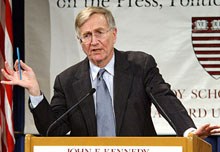2003 Awards
The 2003 Goldsmith Prize for Investigative Reporting was awarded to the Boston Globe for its investigative report “Crisis in the Catholic Church.”

Launched in 1991, the Goldsmith Prize for Investigative Reporting honors journalism which promotes more effective and ethical conduct of government, the making of public policy, or the practice of politics by disclosing excessive secrecy, impropriety and mismanagement, or instances of particularly commendable government performance.
- Watch the Video
- Read the Ceremony transcript
- Read the Seminar transcript
The other finalists were:
- A team of reporters from the Dayton Daily News for their series “Down on the Factory: Cheap Food, Hidden Costs,” exposing the negative environmental impact of huge, industrialized hog and chicken farms.
- Steve Inskeep of National Public Radio for his exposure of a misguided raid on a village in Afghanistan, with evidence so convincing that the U.S. military was forced to release all their prisoners.
- David Cay Johnston of the New York Times for his articles on tax dodges by corporations and wealthy individuals, which have led to investigations by the IRS;
- A team of reporters at WFAA-TV in Dallas for their exposure of a conspiracy by police and drug dealers to blame drug trafficking crimes on illegal immigrants, a series that spurred investigations that went all the way to the police chief and the attorney general.
- A team from the Wisconsin State Journal in Madison, Wis., that uncovered widespread corruption in state government.
A special award was given to Seth Rosenfeld of the San Francisco Chronicle for “The Campus Files: Reagan, Hoover and the UC Red Scare,” an investigation of how then-governor Reagan and FBI head J. Edgar Hoover had abused their power at the University of California, Berkeley. It took Rosenfeld 17 years to overcome legal hurdles preventing him from publishing the story.
In addition to the investigative reporting awards, the center presented two Goldsmith Book Prizes. The award for an academic book went to Doris Graber of the University of Illinois, Chicago, for Processing Politics: Learning from Television in the Internet Age. The award for a trade book went to Leonard Downie Jr. and Robert G. Kaiser for The News about the News: American Journalism in Peril.
The Goldsmith Career Award for Excellence in Journalism went to veteran investigative reporter Seymour Hersh. Hersh, whose 1969 story on Lieutenant Calley and the My Lai massacre won the Pulitzer Prize and brought him to national prominence, has been exposing the wrongdoing of public figures for more than four decades.
Alex Jones, director of the Shorenstein Center, said that Hersh’s “passion is to reveal what has been hidden, secrets that need to be told. For my money, he is the best investigative reporter ever.”
Stepping to the podium, Hersh gave a riveting talk on his recent experiences covering the Bush administration and the imminent war with Iraq. “This is a very tough time in Washington,” he said. “These folks scare me.”
Hersh said he was “mortified” by the president’s recent news conference in which he passed over reporters whose articles had displeased the White House. “We can’t let him get away with orchestrating us like he did. We’re not trained seals.”
Hersh spoke about the way the White House brands uncooperative journalists as disloyal and the chilling effect this has had on reporting about the war on terrorism. He described his experience investigating the trial of Zacarias Moussaoui, the so-called 20th hijacker.
Hersh said he learned that people in the intelligence community had told Attorney General John Ashcroft that Moussaoui was known by the al-Qaeda leadership to be unstable and was probably not part of the 9/11 conspiracy. They had asked Ashcroft not to ask for the death penalty for Moussaoui but to allow them to try to discover what he knew about the terrorist organization. Ashcroft had refused.
Hersh said that considering the atmosphere the Bush administration has created, he hesitated to publish the story.
“Here I am, Mr. Tough Guy, and I was nervous about getting out in front with this one. I was scared. There’s something about it that just stops us. A lot of stories don’t get done. I don’t know what to do about it – just duck and maybe buy a house in Europe.”
Regarding the attorney general, Hersh remarked: “What can I tell you about John Ashcroft? He confuses his personal concept of God with the Constitution.”
Hersh said he was alarmed that the press is being fed stories based on false information and that in some instances the intelligence community seems to be out of the loop. He mentioned in particular a story that Iraq was buying uranium from Niger, an assertion that later turned out to be false.
“People inside the government say that nothing is as dangerous as letting false information get into the upper levels. It’s impossible that the intelligence people did not pick this up. That means it’s going through special channels. You’re on the edge of chaos, and that’s scary.”
The annual Goldsmith Awards Program receives financial support from the Goldsmith-Greenfield Foundation.
This article is based on one written by Ken Gewertz of the Harvard Gazette.
Ceremony Date
March 11, 2003
Note
The annual Goldsmith Awards Program is funded by the Greenfield Foundation.


